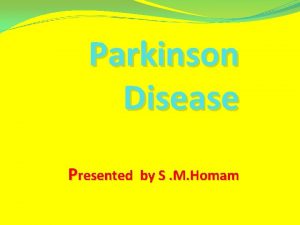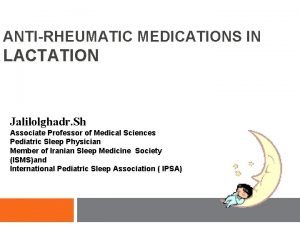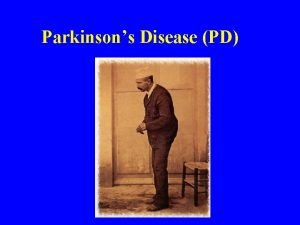ANTIPARKINSONIAN DRUGS Parkinsons disease PD is a progressive









- Slides: 9

ANTIPARKINSONIAN DRUGS

• Parkinson’s disease (PD) is a progressive neurodegenerative disorder. • It is caused by degeneration of substantia nigra in the midbrain, and consequent loss of DA-containing neurons in the nigrostrial pathway. • The symptoms of PD are connected with loss of nigrostrial neurons and DA depletion. • The symptomatic triad includes bradykinesia, rigidity and tremor with secondary manifestations like defective posture and gait, mask-like face and sialorrhoea; dementia may accompany


CNS Antiparkinsonian Drugs

Classification of Antiparkinsonian Drugs 1. Drugs affecting brain dopaminergic system : a) Dopamine precursor : Levodopa. b) Peripheral decarboxylase inhibitors : Carbidopa, Beserazide. c) Dopaminergic agonist : Bromocriptine, Ropinirole, Pramipexole. d) MAO-B inhibitors : Selegiline, Rasagiline. e) COMT inhibitors : Entacapone, Tolacapone. f) Glutamate (NMDA receptor) antagonist (Dopamine facilitator) : Amantadine. 2. Drugs affecting brain cholinergic system : a) Central anticholinergics : Trihexyphenidyl, Procyclidine, Biperiden. b) Antihistaminics : Orphenadrine, Promethazine.

Classification of Antiparkinsonian Drugs 1. Drugs affecting brain dopaminergic system : a) Dopamine precursor : Levodopa. b) Peripheral decarboxylase inhibitors : Carbidopa, Beserazide. c) Dopaminergic agonist : Bromocriptine, Ropinirole, Pramipexole. d) MAO-B inhibitors : Selegiline, Rasagiline. e) COMT inhibitors : Entacapone, Tolacapone. f) Glutamate (NMDA receptor) antagonist (Dopamine facilitator) : Amantadine. 2. Drugs affecting brain cholinergic system : a) Central anticholinergics : Trihexyphenidyl, Procyclidine, Biperiden. b) Antihistaminics : Orphenadrine, Promethazine.


MAO-B INHIBITORS • Selegiline is a selective and irreversible MAO-B inhibitor, that is, it covalently binds specifically to MAO-B receptors which are found predominantly in the brain. • Accumulation of CA’s and hypertensive reaction is not seen, whereas, intracerebral degradation of dopamine is retarded. • When administered with levodopa, it prolongs the effect of levodopa. Used as an adjuvant to levodopa. Ø Adverse Effects : v Postural hypotension, nausea, confusion, involuntary movements and psychosis. v Selegiline is partly metabolised by liver into amphetamine, which sometimes causes insomnia and agitation. v Selegiline is contraindicated in patients with convulsive disorders.

COMT INHIBITORS • Entacapone and Tolacapone are two selective and reversible COMT inhibitors. • They prolong t 1/2 of levodopa and allows larger fraction to cross the blood brain barrier by blocking degradation of dopamine. • Both of them enhance and prolong therapeutic effect of levodopa-carbidopa in advanced Parkinson’s disease. • Not indicated in early Parkinson’s disease. Ø Adverse Effects : v. Worsening of adverse effects of levodopa, such as, nausea, vomiting, dyskinesia, hallucinations, etc. v. Diarrhoea in 10% to 18% patients. v. Yellow-orange discolouration of urine.

















